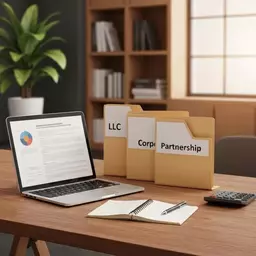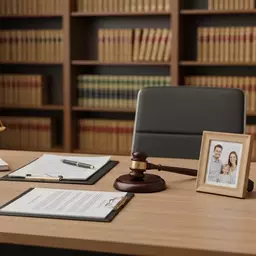Boundary Disputes
- Misplaced markers/surveys
- Historical agreements
- Changes in land use

Have you ever faced a property dispute and felt lost about your rights? You're not alone. Understanding the different types of property disputes can empower you to take action and seek the right legal support.
Understanding the common types of property disputes and recognizing when professional legal assistance is needed can significantly ease the resolution process. This overview highlights key dispute categories and critical red flags for involving a real estate attorney.
Property disputes can be stressful and overwhelming, leaving many feeling unsure about their rights and responsibilities. At E Lawyers Near Me, we understand how important it is for you to navigate these challenges effectively. In this section, we’ll delve into common types of property disputes, exploring boundary issues, easements, and landlord-tenant conflicts, along with practical solutions for resolution.
Recognizing the different types of property disputes can streamline your path to finding the right legal support. Let’s break these down into manageable parts, so you can feel empowered to tackle your situation!
Boundary disputes often arise due to unclear property lines or historical misunderstandings. They can occur between neighbors who may have different interpretations of where their property begins and ends. Understanding the reasons behind these disputes is crucial for finding effective resolutions.
By identifying these causes, you can better approach boundary disputes. In my experience, it’s often beneficial to engage in open communication with your neighbor to clarify misunderstandings.

Knowing where your property ends and your neighbor's begins is essential. You can start by reviewing property deeds and surveys. These documents often provide critical insights into historical context, helping to clarify any ambiguities. If necessary, hiring a professional surveyor can definitively mark property lines.
Additionally, historical context can enhance your understanding. Exploring past land use can unveil reasons behind current disputes, making it easier to negotiate solutions.
When negotiating boundary issues, it's best to approach the conversation with a collaborative mindset. Here are some effective techniques:
In my experience, using these techniques can lead to positive outcomes in many disputes.
Adverse possession is a legal doctrine that allows a person to claim ownership of land under certain conditions, even without the title. To successfully claim adverse possession, one must typically demonstrate:
Understanding this concept can significantly influence how you address boundary disputes. If you believe you might have a claim under adverse possession, seeking legal advice is crucial.
Easements can create confusion, especially if rights and responsibilities are not clearly defined. These legal rights allow one party to use another’s land for specific purposes, like access or utilities. Misunderstandings regarding easements can lead to significant disputes, so clarity is essential.
At E Lawyers Near Me, we often see how easy it is to overlook the complexities of easements. Let’s dive into how to define these rights and resolve conflicts!
Understanding what constitutes an easement is vital for resolving disputes. Generally, easements are categorized into two types:
Each type has its own legal frameworks and implications, which can affect property rights. Knowing the difference helps in understanding the rights you hold or that others might have over your property.
Aiming to resolve easement disputes amicably is often the best course of action. Here are steps you can take:
These steps can help in reaching a solution that respects everyone’s rights and responsibilities.
Easements play an important role in property rights, often dictating how land can be used. Understanding these implications allows property owners to make informed decisions about their land usage and navigate potential disputes effectively.
Being aware of the easement status on your property is essential; this knowledge can empower you to protect your rights and maintain good relations with neighbors.
Landlord-tenant disputes are quite common and can stem from various issues, including lease violations or disagreements over security deposits. It’s crucial to address these conflicts promptly and effectively to maintain a positive rental experience.
As someone passionate about simplifying legal complexities, I’ve seen how knowledge can empower both landlords and tenants to resolve issues. Let's explore some common disputes and how to handle them!
Lease violations may involve issues like unauthorized pets, property damage, or failure to pay rent. Addressing these violations requires clear communication and understanding of the lease terms.
When it comes to security deposits, disputes can arise over deductions. Keeping accurate records of the property's condition can be beneficial in these discussions.
Mediation can be a useful tool for resolving disputes between landlords and tenants. It allows both parties to express their concerns in a safe environment. The ICC (International Chamber of Commerce) provides statistics and insights into effective dispute resolution mechanisms, including mediation, which can be particularly useful in these situations. If mediation fails, legal recourse might be necessary, but it's typically seen as a last resort.
Understanding the legal processes and your rights can ensure that you approach any disputes with confidence.
Tenants have specific rights that protect them under rental agreements, such as the right to a habitable living environment and protection against unlawful eviction. Knowing these rights is essential for both tenants and landlords. The OECD (Organisation for Economic Co-operation and Development) has also explored various frameworks for online dispute resolution, which can offer alternative avenues for resolving tenant-landlord issues efficiently.
Being informed about these rights can help tenants advocate for themselves and maintain a healthy rental relationship.
As we can see, understanding these common types of property disputes allows us to navigate through them more easily. Identifying the type of dispute you are facing can guide you in seeking the appropriate resources and legal support. With E Lawyers Near Me, we are here to ensure that you have access to experienced legal professionals who can help you resolve these issues effectively!
When dealing with property disputes, always document your communications and agreements. Keeping a record of conversations, emails, and any written notices can be invaluable should the situation escalate. This evidence not only strengthens your position but also helps clarify misunderstandings before they become bigger issues.
Knowing when to seek professional legal help can be a game changer in resolving property disputes. Many individuals may hesitate to involve an attorney due to concerns about the costs or complexity. However, recognizing the right moments to consult with a legal expert can save you time, money, and stress in the long run. At E Lawyers Near Me, we understand these challenges, and we're here to guide you through the decision-making process!
There are several scenarios where it becomes crucial to seek legal counsel. Understanding these red flags can help you make informed decisions:
If you encounter any of these situations, it’s wise to contact a real estate attorney who can provide tailored advice and support. It's essential to act promptly to avoid prolonging the stress and potential financial implications!

Here are some specific red flags to be aware of that signal it’s time to reach out to a legal expert:
By recognizing these signs early on, you can prevent the situation from worsening. Remember, consulting a professional can provide you with clarity and direction!
When contemplating whether to hire a lawyer, it’s helpful to perform a cost-benefit analysis. Here’s how to break it down:
Ultimately, engaging a knowledgeable attorney can often outweigh the costs, especially when you consider the potential risks of navigating disputes alone. The American Arbitration Association-International Centre for Dispute Resolution (AAA-ICDR) Foundation provides valuable resources on dispute resolution, highlighting the benefits of professional intervention. Investing in legal advice is an investment in your peace of mind!
If your property dispute escalates to a court case, understanding court orders is vital. These orders can dictate various aspects of property use and rights. Here are some key points:
Being informed about these aspects can help you navigate the legal landscape more effectively. If you feel overwhelmed, don't hesitate to reach out to E Lawyers Near Me for help in finding an attorney who can assist you through the process!
Here are some common questions about property disputes and seeking legal help:
Here is a quick recap of the important points discussed in the article:
Choosing Your Business Structure Guide

Choosing the right business structure is crucial for entrepreneurs embarking on their journey. The d
Preparing for Child Custody Cases

Are you feeling overwhelmed by the complexities of child custody cases? You're not alone. Many paren
Public Defender vs. Private Lawyer

As you venture into the complexities of the legal world, understanding your options is paramount. Wi
Choosing Your Business Structure Guide
Preparing for Child Custody Cases
Public Defender vs. Private Lawyer
Property Law Consultation Expectations
Understanding Immigration Lawyers' Roles